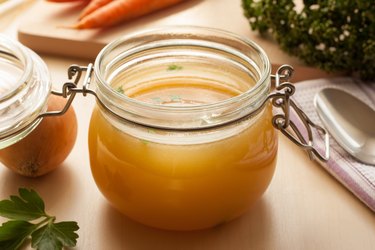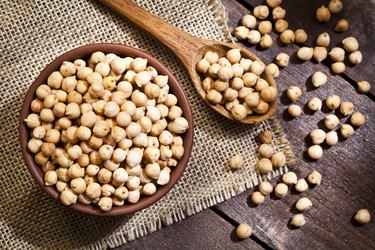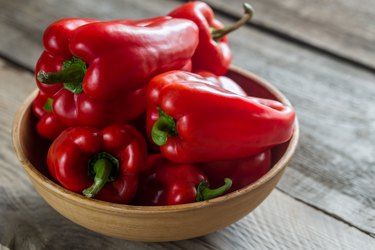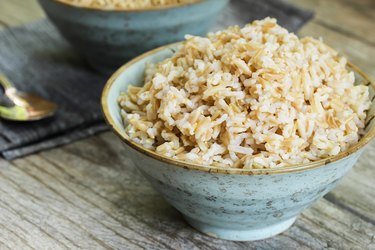12 Foods High in Collagen for Healthier Skin and Joints
By Kelsey Kloss
LIVESTRONG.com
Collagen has a reputation for keeping skin taut and youthful — after all, it’s the most bountiful protein in your body.
Collagen is found in your skin, yes, but also in your muscles, bones, tendons, organs, ligaments, blood vessels, intestinal lining and other connective tissues, per the Cleveland Clinic. That’s also why the best sources of collagen are animal products.
As you age, your collagen naturally decreases, which contributes to wrinkles and crepey skin, stiffer tendons and ligaments, shrinking or weakening muscles, joint pain or osteoarthritis from worn cartilage and even gastrointestinal problems as your digestive tract lining thins.
Besides aging, the top reason for too little collagen is a poor diet. However, you can get this powerful protein naturally from collagen-rich foods and from foods that build collagen, per the Cleveland Clinic. Collagen production requires vitamin C, zinc, copper and protein, so eating grub rich in these nutrients can help maintain your collagen levels.
Try these collagen-rich foods for skin, joints and hair and foods that will help your body increase collagen production naturally.
1. Bone Broth

Whether you buy it in the grocery store or make it yourself, bone broth draws the collagen out of beef, chicken or fish bones, resulting in a savory liquid you can drink or use in other dishes, per the Cleveland Clinic.
Still, many people find sipping on bone broth to be a soothing ritual — so if you love it, there’s no harm in trying it to increase collagen naturally.
2. Chicken
Chicken is the source of several collagen supplements, but besides being one of the best sources of collagen, it also provides the protein (and therefore, the amino acids) your body needs to create collagen on its own.
Chicken breast has 55 grams of protein per 6 ounces cooked. It also provides 15 percent of the daily value (DV) for collagen-building zinc and 8 percent DV for copper. Try the poultry in these low-calorie chicken recipes.
3. Beef
Like chicken, beef is the source of many collagen supplements but eating the meat can also help your body produce collagen on its own. Beef steak is rich in protein with 48 grams per 6 ounces cooked. It also provides an impressive 114 percent of the DV for zinc, a mineral your body needs to produce collagen.
Try it in these healthy stew meat recipes that aren’t stew.
4. Salmon
Marine collagen is made from the scales of fish — and while you won’t be chowing down on scales for dinner, seafood like salmon can still support your body’s natural collagen production.
Coho salmon has 40 grams of protein per 6 ounces cooked, plus 13 percent of the DV for collagen-building copper. Try it in these tasty salmon recipes.
5. Chickpeas

Legumes are a good way to increase collagen naturally, but chickpeas (garbanzo beans) are a particularly good source of copper with 64 percent of the DV per cup cooked. They also provide 23 percent of the DV for zinc, plus 15 grams of protein.
It can be difficult to find collagen-rich vegetarian food, but chickpeas are a great way to naturally support your body’s production with essential nutrients. Try them in these high-protein chickpea recipes.
6. Eggs
Proline is one of the primary amino acids needed for collagen production, per a September 2020 report in StatPearls, and one large egg packs 256 milligrams of proline and 6.3 grams of protein.
Try the kitchen staple in these nutritious egg recipes.
7. Milk
Whole milk offers 15 grams of protein per 16 ounces, making it an easy way to support your collagen production if you’re not keen on sipping bone broth. It also provides 16 percent of the DV for zinc and 14 percent of the DV for copper.
8. Red Bell Peppers

Another great source of collagen-building nutrients, sweet red bell peppers provide 169 percent of the DV for vitamin C each. Vitamin C regulates the synthesis of collagen, but the amount of vitamin C in your skin — along with your body’s production of collagen — naturally declines with age, per Oregon State University. That’s why it’s important to get enough C along with collagen.
Red peppers also have 21 percent of the DV for vitamin A, which helps to maintain your skeletal and soft tissue, mucus membranes and skin, per the U.S. National Library of Medicine.
9. Oranges
Oranges are famously rich in vitamin C, with 109 percent of the DV each. Try the fruit in these immune-boosting orange recipes.
As for other fruits, bananas offer 13 percent of the DV of vitamin C and 12 percent of the DV for copper. So while bananas don’t have collagen themselves, they can provide a decent amount of nutrients that help build collagen in your body.
10. Broccoli
Vegetables are not high in collagen but produce like broccoli can help your body produce more of the protein. Broccoli offers 90 percent of the DV for vitamin C per cup raw, plus small amounts of copper and zinc.
11. Walnuts
Walnuts provide 50 percent of the DV for collagen-building copper per ounce raw. They also have some zinc and are a plant-based source of protein.
Beyond helping your skin look youthful, nuts may actually help you live longer: People between the ages of 55 and 69 who ate at least 10 grams of tree nuts or peanuts (about half a handful) every day had a lower risk of dying from major causes such as respiratory disease, cancer, diabetes or heart disease than those who did not, per a May 2015 study in the International Journal of Epidemiology.
12. Brown Rice

Brown rice is a healthy way to fit in collagen-building minerals: It has 24 percent of the DV for copper and 13 percent of the DV for zinc per cup cooked.
In general, whole grains like brown rice are a better option than refined grains, which a stripped of many valuable nutrients and compounds (including fiber, B vitamins, iron, copper, zinc, magnesium, antioxidants and phytochemicals) during processing, per the Harvard T.H. Chan School of Public Health.
___
https://www.livestrong.com/article/121952-collagen-rich-foods/
